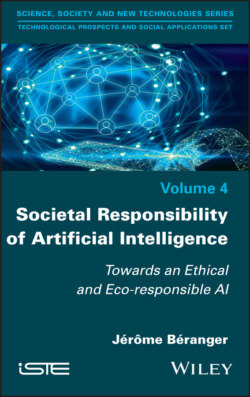Читать книгу Societal Responsibility of Artificial Intelligence - Группа авторов - Страница 7
Introduction
ОглавлениеTo the great promises that AI brings, it must meet a great human responsibility.
The digital world is characterized by its immediacy, its density of information, its omnipresence, in contrast to the concrete world of things. Now, with the multiplication of means of connection, the decrease in technology costs, the new capacities of data collection and algorithmic processing, we realize that we can communicate elements of our environment that were silent until now. We are witnessing the multifaceted development of new information and communication technologies (NICTs), illustrated by the emergence of technologies associated with Big Data; connected objects; algorithms; nanotechnology, biotechnology, information technology, and cognitive science (NBIC); blockchain; artificial intelligence (AI); virtual and augmented reality; and even quantum computing. AI is developing at an extremely rapid pace. We should expect to see significant changes in our society as AI systems become embedded in many aspects of our lives.
This multifaceted digital phenomenon is bringing different universes together by adding the speed, intelligence, and ubiquity of digital technology to the objects associated with these NICTs. Major developments related to AI in healthcare, autonomous vehicles, cybersecurity, education, home and service robots are improving the quality and comfort of our lives every day. Now, AI is fundamental to address many of the major challenges facing humanity, such as climate change, global health and well-being, natural resource development, and reliable and sustainable legal and democratic systems. This technology is, therefore, changing the way we live, consume, function and work. This is illustrated by a disruption with the past in the relationship and link that each person has with his or her neighbors. From then on, these interactions force the system to rethink each human activity. This is the beginning of a silent but very present revolution that is happening right before our eyes. A new era of change and disruption where survival inevitably requires reactivity, adaptability, creativity and, therefore, innovation.
Consequently, this technoscientific context is conducive to the development of an increasingly important international cultural and intellectual movement, namely transhumanism, whose objective is to improve the physical and mental characteristics of human beings by relying on biotechnologies and other emerging technologies. This current of thought considers that certain states of the human condition such as illness, disability, pain, aging and death are not fatal in themselves and can be corrected or even eliminated.
Thus, technological revolutions have enabled a change of scale in the exploitation of digital data, particularly in the field of genetics. They can be produced in large quantities, in an increasingly precise manner and preserved over an indefinite period of time. It can be observed that advances in computer science have made it possible, through the creation of specific programs, for databases to be interoperable, thus allowing for the fusion of data from various and multiple sources. To this, we can add the development of new ways of accessing data, in particular through the multiplication of data sources of all kinds. Crowdsourcing1 is becoming one of the new devices allowing easy access, in real time, to digital data in order to develop research (Khare et al. 2015).
